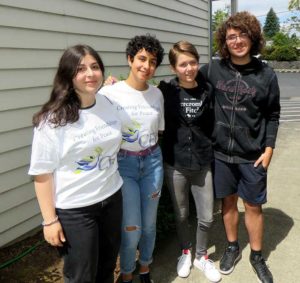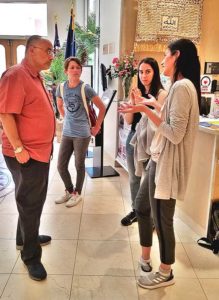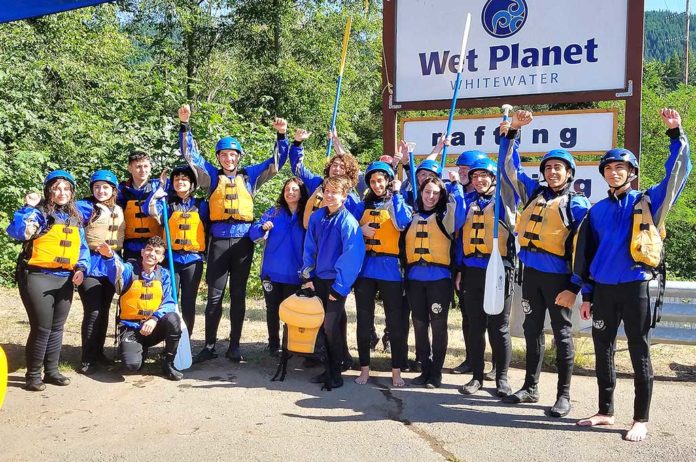Imagine growing up on an island claimed by two countries with a border dividing it, where children on each side are taught to hate and distrust the other side. That is the reality for children growing up today on Cyprus, the third largest island in the Mediterranean located southeast of Greece and south of Turkey, with Greece and Turkey each claiming part of it.
Five Greek Cypriot and five Turkish Cypriot teenagers were in Tigard in late July, part of a month spent in the United States as part of the Creating Friendships for Peace program, which works to develop friendships, trust and respect between those from both sides of conflicts. The students lived with host families in the area, and the Tigard Noon Rotary Club is one of the program’s sponsors.

Below are “before” and “after” comments from two Greek Cypriots and two Turkish Cypriots after their eyes were opened to the truth about their history:
Greek Cypriot Lara: “We were taught that Turkey invaded and that it was not an intervention… I kept an open mind and learned that it was not all Turkey’s fault. The act of Turkey coming to Cyprus was not as aggressive as we were taught.”
Turkish Cypriot Peri: “First of all, we were taught that Greece was the invader and came to push us out. There was lots of slaughter, murder, rape. Turkey came to save us and did, but we’re tied to them… We are more similar than different in so many ways. That we young people are the only ones who see it is heartbreaking.”
Greek Cypriot Victoria: “I was taught that most of all the other side is to blame. We were taught that they stole our land and property and killed our children, family members and friends, and took the north side of Cyprus and don’t allow us to go there… Before the war, everyone used to live with each other. I grew up never meeting a Turkish Cypriot, and when I did, it was just another human being. We started the war. We started the slaughtering and wanted independence.”
Turkish Cypriot Erdem: “The Greek Cypriots talk about the Turkish invasion in 1974, but for us it was a peace movement. Our history is so complicated… We’re all from the same island. I have lots of friends on both sides.”

On July 15, 1974, Greek Cypriots with help from a Greek military junta staged a coup to make Cyprus part of Greece. Five days later Turkey invaded the island and captured the northern part, displacing 150,000 Greek Cypriots and 50,000 Turkish Cypriots. In 1983 a separate Turkish Cypriot state was officially established.
“In the sixth grade – middle school – we had to do a project,” Peri said. “We were told the Greeks attacked a Turkish Cypriot town and slaughtered the people. Our project had to show photos of dead and bloody people. It was traumatic.
“It shows the amount of manipulation that went on. We weren’t even born yet, but the current generation is teaching us to hate all others. We are taught they invaded us and slaughtered us.”
Victoria explained, “There is a huge flag painted on a Turkish Cyprus mountain facing Greek Cyprus that flashes bright lights at night. On July 15th and 20th every year the war sirens go off early in the morning for five minutes that you can hear everywhere to remind us of the invasion. I get chills when I hear it.
“We were never taught that before the war, Turkish Cypriots lived in the (Greek) south and were forced out. After the war, they started moving people from Turkey to build the Turkish Cypriot population.
“Hatred is passed on in schools and in families. The older generation created all these problems that are still with us.”
Erdem added, “I go to the only bi-communal school on Cyprus, I think, that serves both Greek and Turkish Cypriot students. The bus picks us up every day, and I have to show my ID every day when I cross the border into Greek Cyprus. When I said I was going to go, my grandma said, ‘The Greeks will cut you up.’
“I have not personally experienced racism but some of my friends have.”
Peri noted, “(At a camp we went to in Maryland when we arrived in the U.S.) we did a walk of history. They divided us the way we are divided on the island, and each of us wrote down what we were taught, and the papers were placed on each side of a path. We walked down the path and read both sides and clearly saw the differences in what we were taught.
“My right to learn (the truth) has been taken away from me. The war has ended, but the results of that war shouldn’t be accepted.”
Victoria said: “I went to public school and heard such things as ‘we should kick the Turks out’ and ‘a good Turk is a dead Turk.’
“There is a Cypriot dialect. There are so many words in common. I can basically understand the Turkish language. We make the same products. We eat the same food. Before I had no idea of the things we have in common.”
Peri added: “Most people my age believe what they are taught. Only Turkish Cypriots can cross the border. One friend said that if I cross the border, I should take rocks and throw them at the Greek Cypriots’ heads.
“The older people want to keep us separate. I used to imagine the Turkish Cypriots as monsters, but they are just people.”
This summer CFP brought 20 Greek-speaking Cypriots and 20 Turkish-speaking Cypriots to the U.S. (10 in the Portland/SW Washington area) as well as 10 teens from Israel and 10 teens from Palestine regions from a new partnership with the Jerusalem Peace Builders. These teens are all being hosted by American families.
“CFP is about building bridges in divided communities,” said Melody Stone, CFP Oregon/SW Washington area coordinator. “We do this through forming friendships, and building trust and respect among the teens, which replaces the hatred and fear they have been taught. We do this two teens at a time supported by families willing to open their home and hearts towards helping these young teens be the future of change in their countries.
“They then form lifelong friendships with them. We do not take any political position on the island but are a bi-communal peace and conflict resolution program that has been given the status of the most successful bi-communal program in Cyprus, and our work is just beginning in the regions of Israel and Palestine.”
People can help by hosting, donating money, volunteering during the teens’ time here in Oregon/Washington, or donating services or gift certificates for activities. There are many teens in Cyprus who do not have the opportunity to come on the U.S. hosting experience due to lack of host families.
As a 501 (c) (3) non-profit, the program is fully funded by donations and run by volunteers. Those interested in learning more about the program can contact Stone at Melodys@friendships4peace.org or Tammy Haas, the USA executive director, at 360-907-6991 or at haas@friendships4peace.org. The website is www.friendships4peace.org.






















